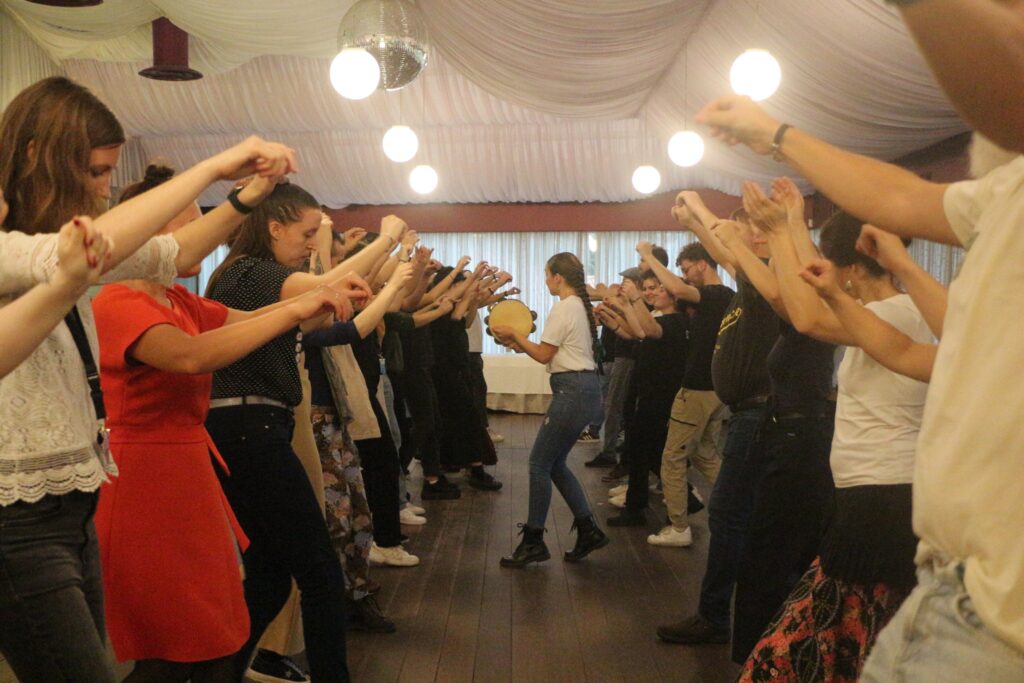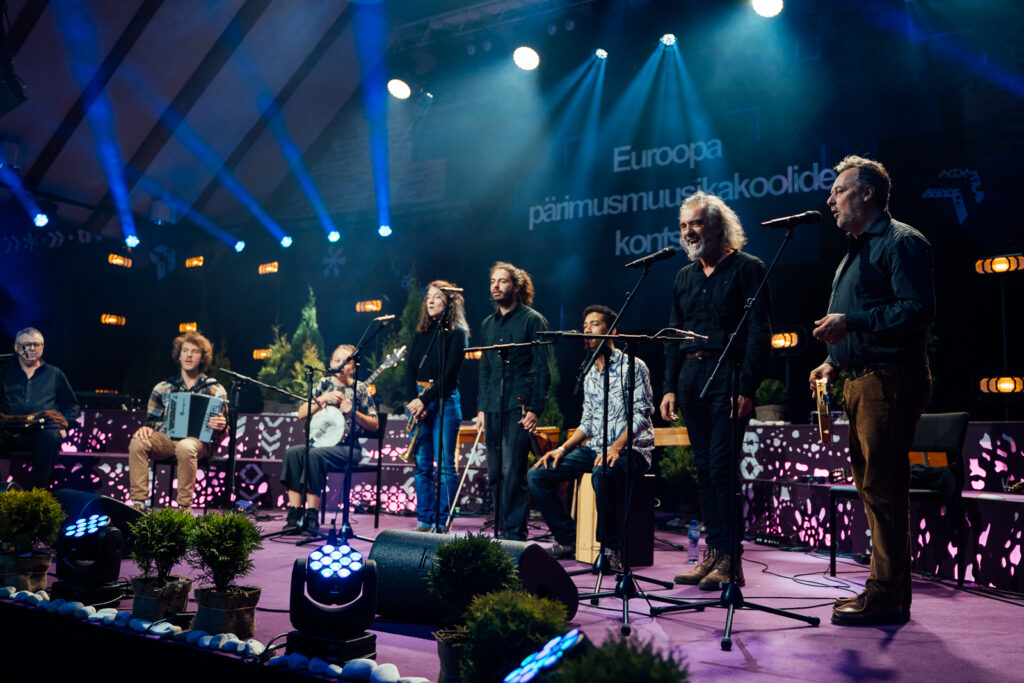Enseignement Supérieur
Formation professionnelle continue
Programme : May 17-18, 2024 – Poitiers “European traditional music”

For the past three years, the pôle Aliénor has been part of the TUNE project (Traditional music Undergraduate Network in Europe), a European strategic partnership under the Erasmus+ program with five other partners : the University of Ioannina in Greece, the University of Tartu in Estonia (Viljandi culture academy), the University of South-East Norway (USN) Rauland campus, the Higher Conservatory of Music of Vigo in Spain(CSM Vigo) and the European Association of Conservatoires (AEC).
The pôle Aliénor is organizing and hosting the final intensive week, which will take place in Poitiers (86), France, from 13 to 18 May 2024 and will bring together students, artists and teachers from the partner institutions. Programme and registrations for final event “TUNE opening borders” of TUNE project are now available !
9 pm : European traditional ball
in partnership with the UPCP Métive
salle des fêtes, 13 rue de la mairie, La-Ferrière-en-Parthenay (79)
All audiences, entrance : 6€.
Informations : www.metive.org

in partnership with FAMDT (federation of players in traditional music and dance)
pavillon universitaire musique et danse (PUMD) Bat. E08 15, rue Guillaume VII le troubadour, Poitiers
The entire day will be conducted in French and English.
9am-10.30am : welcome and registration : presentation of TUNE pedagogical results and its continuation.
10.30am : roundtables
Open to all audiences, roundtables can be attended online upon subscription.
The three round tables will focus on issues concerning young traditional musicians, who are at the heart of the TUNE project. Each panel will include a student.
Thanks to databases, online platforms and portals that have been established in recent decades, the ease and speed of access to recorded sources is changing the way we approach traditional music repertoires. In the space of a few minutes, several versions of the same tune, ranging from archive recordings to arranged versions, can be accessed and shared, and this tends to disconnect the object from its cultural substratum far removed from a revivalist cultural practice. Should this be viewed as an irreversible loss, or does this relationship with sources constitute a new form of oral transmission, of orality, for young musicians? Furthermore, should we consider promoting schemes that put musicians in a position to collect a living popular tradition, enabling them to move away from a single instrument and its repertoire and enter squarely into the globality of a tradition?
Speakers :
André Gladu, independant filmmaker (Quebec)
Xiana Rei Teixeiro, artist teacher-Conservatorio Superior de Vigo, Galicia (Spain)
Benjamin Rygh, artist teacher-university of SouthEastern Norway
Emmanuel Turpin, traditional music student-pôle Aliénor
Moderator : George Kokkonis, ethnomusicologist teacher-university of Ioannina (Greece)
Musical encounters generated by the mobility of artists and tradition bearers, as well as international migration, have given rise to countless artistic productions. These productions also arise through inter-aesthetic encounters, where musical cultures that were once more or less isolated can now cross paths more easily. These encounters are undoubtedly socio-cultural and political responses to the inward-looking attitudes of Western societies. From a cultural and musical point of view, what does traditional music, which has geographical roots, have to gain or lose in this societal context? How are young traditional musicians addressing this question? And beyond this, in encounters between different arts forms, what relationships are being developed between musicians, dancers, storytellers and scenographers with the aim of “telling the story of tradition”, both in everyday life and in the imagination?
Talia Bachir-Loopuyt, ethnomusicologist-pôle Aliénor, university of Tours
Hoëla Barbedette, administrator-Drom association
Gwenaël Quiviger, PhD in socio-anthropology, director-music school Toutes-Aides of Nantes
Flora Wiederkehr, traditional music student-university of SouthEastern Norway
Moderator : Stefan Gies-association européenne des conservatoires (AEC)
Can an experience such as TUNE, or other similar experiences, lead to better professional integration for young traditional musicians? We can imagine that the encounters experienced during these projects will provide fertile ground for establishing tomorrow’s European musical networks in the field of traditional music. The links forged and the artistic aims that emerge will inevitably give rise to new musical projects. Appropriate support, particularly for mobility, at the European level, should then respond to this trend. The familiar notion of “from local to global” undoubtedly also needs to be rethought when it comes to traditional music with strong links to a cultural area.
Iván Abal Pulleiro, artist teacher-Conservatorio Superior de Vigo, Galicia (Spain)
Triinu Orgmets, traditional music student-Viljandi culture academy, (Estonia)
Ricet Gallet, member of FAMDT administration, strategic and politic direction- Centre régional des musiques traditionnelles en Limousin. To be confirmed.
Philippe Ribour, inspecteur-ministry of Culture. To be confirmed.
Moderators : Kadri Steinbach, head of studies-Viljandi culture academy, (Estonia) and Laura Ellestad, TUNE project coordinator-university of SouthEastern Norway
2pm and 3.45pm : 5 worksops with guest artists
Duration 1h30
Open to young musicians under registration
The workshops will take place in two 1h30 sessions. It is therefore possible to register for two workshops (see registration form). The workshops are open to all instruments and vocals. Maud Herrera’s and Gabriel Durif’s workshops will be specifically devoted to voice. The five artists will welcome young and “not-so-young” established musicians to take them through their creative process. To do this, they will invite them to immerse themselves in a proposed musical practice, as well as describing how they approach their own field of musical creation.
- Atelier #1
Cätlin Mägi (Estonia) – jews harp, electronics and voice - Atelier #2
Maud Herrera (France, Occitan areas) – voice - Atelier #3
Magnus Wiik (Norway) – fiddle, guitar - Atelier #4
Erwan Kéravec (France, Brittany areas) – Scottish bagpipe, electronics - Atelier #5
Gabriel Durif (France, Limousin areas) – voice
5.30pm : Closing plenary with all participants.
Duration 30 min.

©Ako Lehemets
CREC – concert by European students
artistic direction by Maud Herrera and Romain Baudoin
Artists from the Hart Brut collective meet students from the TUNE project for a dialogue on traditional cultures in all their diversity. In Hart Brut’s luggage are the sounds of their Béarn tradition and, under their feet, the Pyrenean landscapes they walk through every day. This adventure takes students from the five corners of Europe into a new world of creation and improvisation, in an open-ended work CREC (the cave, in Occitan). It’s an experience of discovery and sharing, taking the musicians and the audience on a journey of music and sound, rich in intercultural encounters.
Auditorium Saint-Germain, 5 rue Franklin, Poitiers
All audience, free upon registration